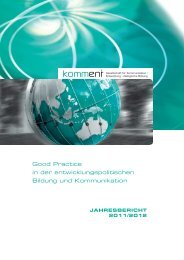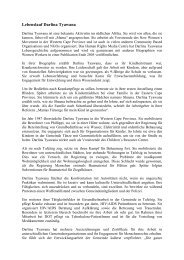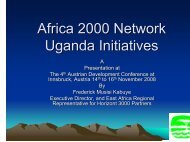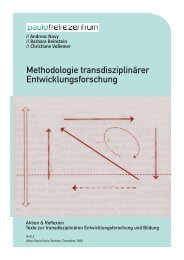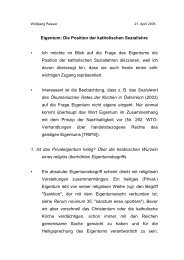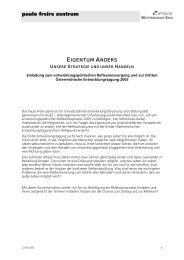DA Elisabeth Lambrecht.pdf
DA Elisabeth Lambrecht.pdf
DA Elisabeth Lambrecht.pdf
Erfolgreiche ePaper selbst erstellen
Machen Sie aus Ihren PDF Publikationen ein blätterbares Flipbook mit unserer einzigartigen Google optimierten e-Paper Software.
!)<br />
)<br />
8KUQKP!<br />
) )<br />
6.2 Abstracts<br />
The absence of developmental progress in<br />
many third world countries unleashed a<br />
wave of critical discourse among scholars<br />
of development theory at the end of the<br />
1980s, commonly known as the “crisis of<br />
devlopment theory“. It triggered, inter alia,<br />
the postdevelopment theory. Upon the influence<br />
of post-structuralist and neomarxistic<br />
theory traditions, postdevelopment<br />
theory brought about a criticism of<br />
development along with political claims.<br />
The new theory fundamentally criticizes, as<br />
well as refutes development as an idea,<br />
concept, and notion, however, under the<br />
premises of a relativistic conception of culture<br />
development is remodeled as “ethnodevelopment“.<br />
In this account, the analysis of cultural<br />
relativism, which had largely been neglected<br />
to this point, will be considered in linguistic<br />
terms and examined in the context<br />
of its paradoxical implications based on<br />
three selected authors: Gustavo Esteva,<br />
Arturo Escobar and Wolfgang Sachs. The<br />
analytical language criticism of cultural<br />
relativism, which was introduced by John<br />
W. Cook through his monography “Morality<br />
and Cultural Differences“ shall suit the<br />
analysis of cultural relativism and provide<br />
the methodological framework of this interdisciplinary<br />
case study.<br />
The study will elucidate that the three authors<br />
of post-development not only approximate<br />
to the conception of cultural relativism<br />
in theory, but that their fundamental<br />
rejection of development and the conception<br />
of a new endogenous “development“<br />
building upon this, can only be conceived<br />
entirely and coherently in view of the relativistic<br />
conception of culture.<br />
Das Ausbleiben der Entwicklungsverheißungen<br />
für viele Länder der Dritten Welt<br />
löste Ende der 1980er Jahre breite kritische<br />
Diskussionen in der Entwicklungstheorie<br />
aus, die auch als „Krise der Entwicklungstheorie“<br />
bekannt ist. Sie entfachte unter<br />
anderem die Theorieströmung des Post-<br />
Development, die unter dem Einfluss poststrukturalistischer<br />
und neomarxistischer<br />
Theorietradition eine mit politischen Forderungen<br />
versetzte Ideologiekritik formulierte.<br />
Entwicklung wird dabei als Idee, Konzept<br />
und Begriff fundamental kritisiert und abgelehnt,<br />
erfährt allerdings unter den Prämissen<br />
eines relativistischen Kulturverständnisses<br />
als „culture economy“ wiederum ein<br />
neues Gesicht. Das bis dato nur marginal<br />
untersuchte relativistische Kulturverständnis<br />
wird in der vorliegenden Arbeit anhand<br />
der drei ausgewählten Autoren Gustavo<br />
Esteva, Arturo Escobar und Wolfgang<br />
Sachs sprachanalytisch untersucht und auf<br />
seine paradoxen Implikationen überprüft.<br />
Als methodischer Rahmen dient der interdisziplinär<br />
ausgerichteten Fallstudie die<br />
analytische Sprachkritik, die John W. Cook<br />
mit seiner Monographie „Morality and Cultural<br />
Differences“ herausragend für eine<br />
Analyse des Kulturrelativismus vorlegt. Die<br />
Untersuchung führt der LeserInnenschaft<br />
vor Augen, dass die drei Post-Development<br />
Autoren nicht nur theoretisch mindestens in<br />
der Nähe des Kulturrelativismus zu verorten<br />
sind, sondern dass auch ihre fundamentale<br />
Ablehnung von Entwicklung und die<br />
darauf aufbauende Idee einer neuen endogenen<br />
„Entwicklung“ erst gänzlich und<br />
zusammenhängend vor dem Hintergrund<br />
des relativistischen Kulturverständnis zu<br />
verstehen<br />
sind.<br />
!<br />
"#$!



